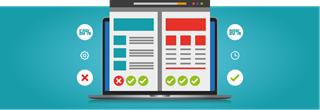It’s among the most important aspects of setting up a new business, but with so many things to think about before launch day, web design is something that many start-ups don’t put enough thought into right at the beginning.
Start out with something beautiful and you’ll give your new venture the best chance of gathering pace from the outset. Start out with something clunky and, well, we hope you have a plan B.
Today we'll be discussing the best tips and tricks whatever style of website your startup business needs, e.g. ecommerce site, lead gen website, brochure website etc. We'll dip into branding and web design for startups, and link to a humdinger of an article (or two) to help you plan your website step-by-step and find a suitable web design agency. Plus we'll talk budgets, GDPR, testing - the whole shebang.

Goal setting and project management
Planning a website is crucial. We’d argue that the success of any web design project hinges on the amount of planning you do at the start.
Before you can move forward, setting out your intention and purpose for the website at the start is vital. You need to set a purpose for your website, some primary goals. Essentially, what do you want users to do? Buy a product? Make contact? Book an appointment? Phone? Sign up for something? Whatever it is, you need some website planning sessions to focus on your requirements.
Your website needs to provide an engaging experience to keep users returning and attract conversions, so it’s well worth putting user experience at the heart of everything you think about during your planning phase.
For example, here at Intuitiv, our user experience architect uses wireframes to create lo-fi, skeletal views of potential website pages. This ensures the user journey is as clear and engaging as possible from the outset.
In your planning phase you'll probably want to set out:
-
A budget.
-
What you want users to do.
-
The purpose and goals for your website.
-
The types of content that will be included on the site.
-
The overarching values and messaging you want your site to communicate.
-
The routes and actions you want users to take.
-
The site structure.
-
How products and product information are managed.
-
Choosing a web design agency.
-
How enquiries and subsequent user data are handled.
-
How to maintain your website.
You’re probably bursting with ideas for your new site, and the temptation is to run before you can walk. But here's some more digital food for thought - why not go down a more agile or evolving route? Nail an MVP (Minimum Viable Product) version of your website and then build incrementally once you have further insights into what’s working and what’s not. That way, you won’t burn up too much budget too soon.
- You'll find more detail in our '12 key steps to building a great small business website' article.

Budget
On the subject of budgets, watch any housebuilding TV show and you’ll rarely see projects coming in on budget - don’t accept this with your website build! Proper planning, clear requirements and realistic expectations are crucial to staying within budget.
Your budget will obviously vary depending on your business needs and the scope of the project. Always agree on a budget upfront with your web design agency but be prepared to have some contingency in case you want a number of changes after the build.
Choosing a website design company
Your budget may determine which web design agency you choose. Ultimately though it should still be the one that best fits your needs. For example, if you're planning an ecommerce website or lead generation website you should choose an agency that has successful past experience and case studies, and expect to pay for that experience. If it's a brochure site you're after, then you may not necessarily need to pay for a premium-rate agency as the site may not be so complex to design and build. However, if you are looking for a simple brochure site you still want a professional, modern website design - remember it's the shop window to your business.
You can find some more top tips in our article 'How to find the best Oxford web designers for your business'.
Choosing a content management system
You'll want a website with a content management system (CMS) so you can update your website yourself easily - think news items, blog posts, text updates, special offers. You don't want to have to ask the web designers to make regular updates - it will cause a delay in keeping your site up to date and will cost more in the long run.
You should research the various web content management systems out there. You want to get the best technology at the best value. However, you may have to go with the CMS that the web developers specialise in, but make sure it aligns with your goals.

Plan your content
It’s a cliche, but it’s true: content is king. Your website needs clear information and messaging, backed up by great quality imagery.
But let’s take it a step further: relevant content is king.
Relevant content is a must because:
-
Google uses it as a factor when ranking your site on its search results pages.
-
It will engage your users more, which could lead to more sales and return visits.
You’ll need a website content management system (CMS). This will enable you to easily update the website content yourself, instead of paying for an agency to make the updates for you. Again, Google favours sites with news and blog pages that are regularly maintained, which in turn will help drive traffic to your site instead of your competitors. At Intuitiv Digital, our CMS of choice is Umbraco - here’s why.
Try to plan your content and create your primary content before you launch your new website, not during or after. You don't want to promote and launch your website and attract visitors, only for them to discover there's nothing on the site to engage them, or the site hasn't been updated for six months.
The type of content, the amount of content, how often you'll need to update it, the formatting of the content, the priority content - all this needs to be determined and put in place before your website is launched.
Branding
Plan your branding strategy before launching a new start-up. This can then be incorporated into your marketing, e.g. website, email marketing, brochures, adverts and flyers. Your web design agency may be able to help with this.
Ensure it's consistent. Even down to details like do you capitalise words in headings? Do they have full stops or not? These may seem like small details, but over a page or pages, the branding and content can easily start to look messy and unprofessional if there's no consistency.
- See some of our branding and graphic design work case studies.
Navigational structure
It's a good idea to map out the structure of your website as you see it. This is called a sitemap. It will help your web design agency get a better feel for what you're after and it will help them cost the project. Your web developer can help you with this if you're not sure. You can create a sitemap in whatever format and style you like - plain text file, Word document, PowerPoint, anything really. There are free online tools you can use too, for example, https://www.flowmapp.com/features/sitemap.
Primary content
Referring back to the points earlier about goal setting and what you want your users to do, you need to have clear objectives for your website and clear unique selling points (USPs) when creating your primary commercial content.
By far the most common initial user journey on any website is:
- Landing page, e.g. homepage > 'About Us' page > 'Contact Us' page.
So, make these pages dead easy to get to.
You also want the benefits of your product or service upfront and easy to see. Sell the benefits more than the features. And to guide the user through their journey you need some clear call to action (CTA) content. This way you'll achieve your objectives for the website.
Blog copy
You need some well-written blog posts on your website. Google likes blog posts as they show your website is active and up to date. They can give a sense of expertise in your field and they give you an opportunity to get some key search terms onto your website in a way that benefits the user, not annoys them. Make sure there are some blog posts on your new website before launch rather than an empty space.
Images
Try to use original images where possible for your product or service. Images can make or break a website and therefore your business too. They should be of high quality and the right size. Your web design agency can help with resizing and cropping images and can help with planning which sections of the site the images should appear on. Planning, sourcing and resizing images can take time so this needs factoring into your content plan.

Data protection and security
GDPR
You and your web design agency will need to plan how you'll store customer data safely, especially for ecommerce websites.
The General Data Protection Regulation came into effect on the 25th May 2018. The main purpose of GDPR is to give EU residents more control over their personal data, irrespective of where the personal data is collected or processed. Essentially, this means that information cannot be collected and processed unless consent has been obtained. For example, your site might collect personal data via contact forms, newsletters, and cookies. Clear consent must be gained in these cases and data stored correctly to be GDPR compliant.
As data owners, you’ll need to consider privacy as the default setting. You’ll need to consider data protection compliance from the start, and embed this approach into the website design process. Hence the industry phrase, ‘security by design’.
SSL certificates
If you have an ecommerce website or any website that stores personal details, then your website must have a valid security certificate, sometimes called an SSL (secure sockets layer) certificate. Even if you don't store personal details, it's still a good idea to have a security certificate as search engines prefer it and it's reassuring for users too.
For example, if you look in the address bar of this website you'll see a padlock icon and also the address is https://www.intuitiv.net rather than http://www.intuitiv.net (note the 's'). This is because we use a security certificate on the site.
A security certificate sometimes needs to be purchased separately from your domain, so make sure you ask about this.

Testing
In the enthusiastic mad rush to launch a new website, it's very easy to overlook or not give enough time to testing.
We’re sure you don’t need us to tell you this, but thorough testing is essential before you hit the publish button. It’s hard to win back users after they experience a bug, particularly when you’re a start-up and therefore already an unknown entity. Making sure your site runs smoothly from the outset helps build trust and credibility.
Ask if your web design company uses a staging or test area where your website can be thoroughly tested.
A few top-level things to check before, during and after the website launch:
- How does your website look on desktop, laptop, tablet and mobile?
- Check accessibility - can you navigate around your site just using your keyboard for example?
- Do all the forms work as expected?
- Put through some test orders and test the cancel order and refund processes etc.
- If there's a member or a 'my account'-type area does the login process work as expected?
- Test any 'forgotten password' processes.
- Do all links work and all images show up?
- Are all SEO-related meta tags complete?
- Has your site been submitted to Google?
- Is your CMS working as it should?

Consult a website expert
Finally, cash can be tight when you’re a start-up, but with your website so critical to your business, it pays to get it right from the outset. Hiring a web design agency means you’ll get the best quality design and build for your budget, with experts to hold your hand along the way.
- Read 'How to find the best Oxford web designers for your business' for some insider tips for finding the perfect web agency for you.
Are you starting up a new business and need a website? Get in touch with us today by filling in our contact form or calling us on 01844 888 777.
It could be the start of something special!